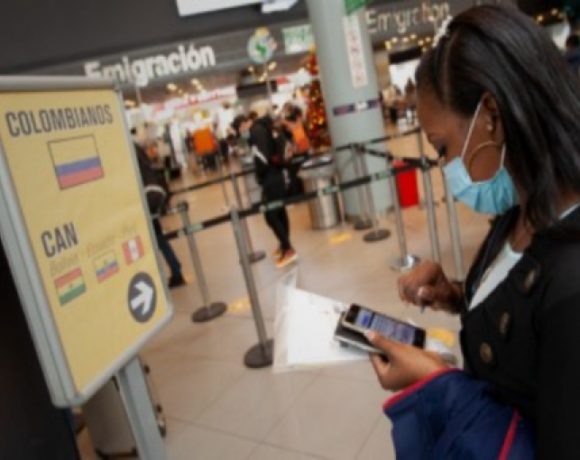Colombia Abolishes PCR Test for International Arrivals, but ‘Total Reactivation’ as Promised by Medellin Mayor Not Guaranteed

Colombia Health Minister Fernando Ruiz announced this morning (June 3) that Colombia has abolished the current mandate for airports to demand that international passenger arrivals must have passed a PCR test against Covid-19 infections — and likewise will no longer require “Coronapp” cell-phone health data for domestic airline passengers.
Simultaneously, Minister Ruiz revealed that under new rules, cities can begin reactivating many types of businesses and events – under certain conditions — which heretofore have been banned or severely restricted because of the Covid-19 pandemic.
Under the new “Decree 580” and “Resolution 777” rules, cities that have more-than 85% occupancy of intensive care units (ICUs) cannot undergo “total reactivation” starting next week — contradicting a June 1 public proclamation made by Medellin Mayor Daniel Quintero claiming that Medellin will have “total reactivation” starting June 8.
The obstacle: Medellin and Antioquia have ICU capacities well over 90% because of continuing high levels of Covid-19 cases, according to the most recent Antioquia departmental data.
“As long as a municipality is above 85%, all restrictive measures are maintained, especially in what has to do with bars, discos, events and crowds,” Minister Ruiz explained.
But whenever a municipality falls below 85% of ICU occupancy, then “opening possibilities are generated with capacity adjusted to the progress of the National Vaccination Plan,” according to the new Ministry rule.
“A city lower than an [85% ICU occupancy] percentage can start with 25% capacity for open public events,” according to the Minister. “Even in closed events, recommendations are included where the minimum distance [between people] can be one meter, which increases the capacity,” as is currently allowed for church or synagogue services and gymnasiums, he added.
“For such scenarios there are special measures such as the use of face masks, which is reinforced in the new regulations, ventilation, washing and disinfection of hands, the new minimum distance between people and indications for self-care,” according to the Ministry.
The new rules allow “a safe opening with conditions that allow us to graduate [to more liberal standards] as vaccination grows and as cities pass that third peak” of the current “third wave” of Covid-19 infections, Ruiz explained.
“This does not mean that we cannot have a fourth peak. The impact continues, but also as we manage to vaccinate, advance and finish ‘phase 1’ of vaccination, of these three initial stages where we are with the most vulnerable people, we can surely have an affectation with a lower mortality rate,” he added.
Compulsory and correct use of a face mask, constant hand washing or disinfection and physical distancing are part of the general measures that are maintained under the new rules, he added.
The current lengthy procedures to obtain permits for the holding of events will be replaced by an “index that we are creating, called the ‘Resilience Index,’ which basically determines how far along a city is advanced in vaccination, how much is the ICU occupation, what is the prevalence of infected people in that city, and the positive testing rate of the virus through tests,” he added.
More Vaccines, More Private Options
Meanwhile, millions more vaccines from foreign vendors are arriving in Colombia this week, hence supporting and advancing the National Vaccination Plan, he said.
“Yesterday [June 2] 580,000 Pfizer vaccines arrived in the country and today [June 3] another 500,000 from the same laboratory will arrive. Tomorrow will arrive another 1 million vaccines from AstraZeneca and next Sunday [June 6] another 1 million doses of vaccines arrive from Sinovac,” he revealed.
As for the upcoming plan to allow private companies to vaccinate their employees, this is likely to start by the end of June, he explained.
“At this moment we already have an agreement with a significant number of [companies and employee associations] for vaccines acquired through the contract that the national government has with Sinovac, where progress is being made in the acquisition of 2.5 million vaccines,” he added.
This week, the Health Ministry will issue a resolution “that refines aspects for the vaccination of private individuals,” he explained.
Medellín Mayor ‘Total Reactivation’ Plan Includes Tax Cut Proposal
On a parallel front, Medellin Mayor Daniel Quintero announced June 1 that as part of the claimed “total reactivation” of the local economy supposedly starting June 8, new job-building tax cuts for businesses will be proposed to the Medellin City Council this month.
“The incentive for foreign investment will be given through the reduction of the Industry and Commerce Tax for companies that have settled in Medellín,” according to the Mayor’s office.
“We are going to reduce taxes for those who help us to reactivate the economy of the city. We want to encourage technology-based companies to locate in Medellín,” Quintero stated.
The new, five-year tax breaks would apply to “technology-based companies based in the city, including those created last year,” according to the Mayor’s office.
“In the first and second year they will have a discount of 100%, in the third of 80%, in the fourth of 60% and in the fifth of 40%.
“Companies that are located in ‘Orange Development Areas’ (San Ignacio, Comuna 13, Prado and Perpetuo Socorro) will have benefits in the payment of their industrial and commercial obligations. In the first year, the discount will be 100%, in the second, 80%, in the third, 60%, in the fourth, 40%, and in the fifth, 20%.”
The proposal also includes foreign companies that newly set-up and create jobs in Medellín. Such companies “will receive tax benefits for five years, with a discount of 100% in the first year, 80% in the second, 60% in the third, 40% in the fourth and 20% in the fifth,” according to the Mayor’s office.
“It is expected that in mid-June the Medellín Council will have a free hand to proceed with the proposals made to reactivate the city’s economy,” including the expansion of international tourism to the city, the office added.
















